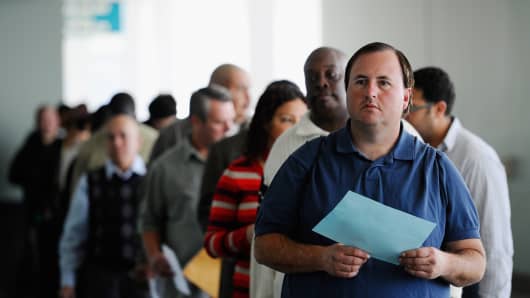The portion filing for benefits shot up to 95% in 2010 and 2011, the study says, but that still means about 200,000 people didn't claim money to which they were entitled.
"They're throwing the money out the window," says David Fuller, an economics professor at Concordia University in Montreal and co-author of the report, which analyzed Bureau of Labor Statistics data.
Many unemployed people aren't eligible for benefits because they worked part-time or weren't at their jobs long enough, for example. In 2009, about 3 million of the average 14.5 million or so jobless people didn't qualify for benefits.
But of the roughly 11.4 million who were laid off and eligible to collect that year, only about 5.7 million filed claims, according to Fuller and the BLS. Those who didn't saved state and federal governments $108 billion — nearly as much as the $121 billion in benefits paid, the study says. That sum dwarfed the $11 billion in benefit overpayments due to clerical errors or fraud.
States pay the first 26 weeks of unemployment insurance. During and after the recent recession, the federal government has paid extended benefits beyond that up to 73 weeks.
The willingness of many jobless Americans to forego unemployment checks isn't new. From 1988 to 2011, an average 37% of those eligible passed on the benefits.
The share of people applying for benefits has risen or fallen along with average duration of unemployment. For example, Americans were out of work for an average of 18 weeks in 2008 and 24 weeks in 2009 — when only half of those eligible applied. But average joblessness rose to about 33 weeks in 2010 and 39 weeks last year as the share seeking benefits soared to 95%.
Average jobless duration has hovered near 40 weeks this year. But it should dip to about 37 weeks in 2013, says Mark Zandi, chief economist of Moody's Analytics. That suggests the portion seeking benefits could drop slightly.
People who don't expect to be out of work long may not apply initially but file claims later as their jobless spells drag on, Fuller says. Some of those who receive severance payments may face restrictions on when they can apply, though that likely accounts for only a fraction of non-collectors, he says.
Other workers, he says, may fear that seeking benefits would rankle their former employers, who must pay more into the unemployment insurance system as more of their workers collect benefits.
Still others are more likely to take a pass in states known for making it tough to apply or qualify, or for investigating applicants whose eligibility is questionable, says Claire McKenna of the National Employment Law Project.


